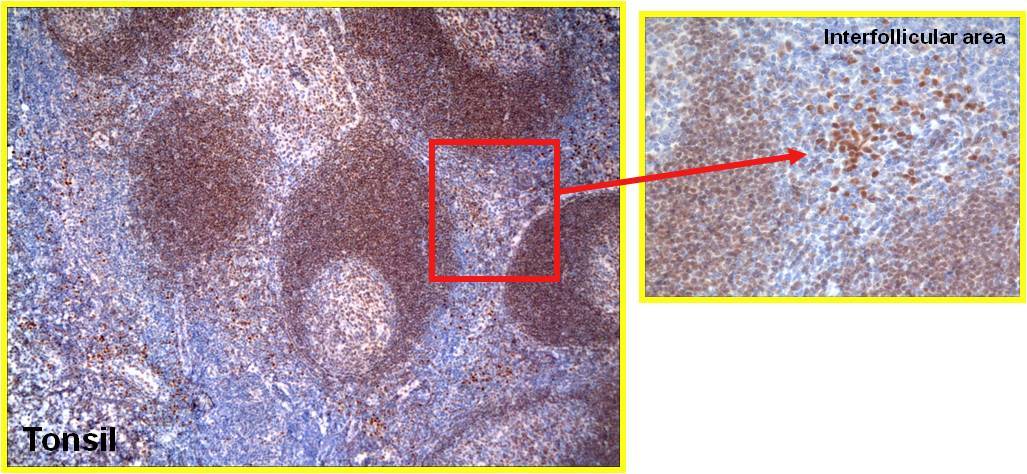Cat. #151750
Anti-BCL11A [BCL11A/123]
Cat. #: 151750
Sub-type: Primary antibody
Unit size: 100 ug
Availability: 3-4 weeks
Target: BCL11A (EVI9, CTIP1)
Class: Monoclonal
Application: IHC ; IP ; WB
Reactivity: Human ; Rat
Host: Mouse
£300.00
This fee is applicable only for non-profit organisations. If you are a for-profit organisation or a researcher working on commercially-sponsored academic research, you will need to contact our licensing team for a commercial use license.
Contributor
Inventor: Alison Banham
Institute: University of Oxford
Tool Details
*FOR RESEARCH USE ONLY (for other uses, please contact the licensing team)
- Name: Anti-BCL11A [BCL11A/123]
- Research fields: Cancer;Genetics;Neurobiology
- Clone: BCL11A/123
- Tool sub type: Primary antibody
- Class: Monoclonal
- Conjugation: Unconjugated
- Molecular weight: Predicted 91 kDa
- Reactivity: Human ; Rat
- Host: Mouse
- Application: IHC ; IP ; WB
- Description: The BCL11A/123 antibody specifically recognises the extra long form of the protein and not the long or short forms of BCL11A. The BCL11A/123 antibody is not cross reactive with the long form of the BCL11B protein that shares significant sequence identity with the immunogen.
- Immunogen: C-terminus of extra long isoform of BCL11A, BCL11AXL (aa 637-835)
- Isotype: IgG1
- Myeloma used: P3/NS1/1-Ag4.1
- Recommended controls: Tonsil (in B cells and plasmcytoid dendritic cells), Neurones and nuclei of some epithelium
Target Details
- Target: BCL11A (EVI9, CTIP1)
- Molecular weight: Predicted 91 kDa
- Tissue cell line specificity: Tonsil (in B cells and plasmcytoid dendritic cells), Neurones and nuclei of some epithelium
- Target background: BCL11A is a KrÄĹşppel zinc-finger transcription factor that was identified originally from a chromosome translocation in aggressive B-cell chronic lymphocytic leukaemia. The gene may function as both an oncogene and a tumour suppressor. Alternative splicing generates multiple isoforms, the BCL11AXL being the largest and most abundant transcript. The protein is differentially expressed during B-cell development and is strongly expressed in plasmacytoid dendritic cells.
Applications
- Application: IHC ; IP ; WB
Handling
- Format: Liquid
- Concentration: 1 mg/ml
- Unit size: 100 ug
- Storage buffer: PBS with 0.02% azide
- Storage conditions: -15° C to -25° C
- Shipping conditions: Shipping at 4° C
References
- Chetaille et al. 2009. Blood. 113(12):2765-3775. PMID: 19096012.
- Molecular profiling of classical Hodgkin lymphoma tissues uncovers variations in the tumor microenvironment and correlations with EBV infection and outcome.
- Marafioti et al. 2008. Blood. 111(7):3778-92. PMID: 18218851.
- Novel markers of normal and neoplastic human plasmacytoid dendritic cells.
- Weniger et al. 2006. Leukemia. 20(10):1880-2. PMID: 16871282.
- Pulford et al. 2006. Leukemia. 20(8):1439-41. PMID: 16710303.
- Gains of the proto-oncogene BCL11A and nuclear accumulation of BCL11A(XL) protein are frequent in primary mediastinal B-cell lymphoma.
- The BCL11AXL transcription factor: its distribution in normal and malignant tissues and use as a marker for plasmacytoid dendritic cells.
- Liu et al. 2006. Mol Cancer. 5:18. PMID: 16704730.
- Fn studies of BCL11A: characterization of the conserved BCL11A-XL splice variant and its interaction with BCL6 in nuclear paraspeckles of germinal center B cells.





